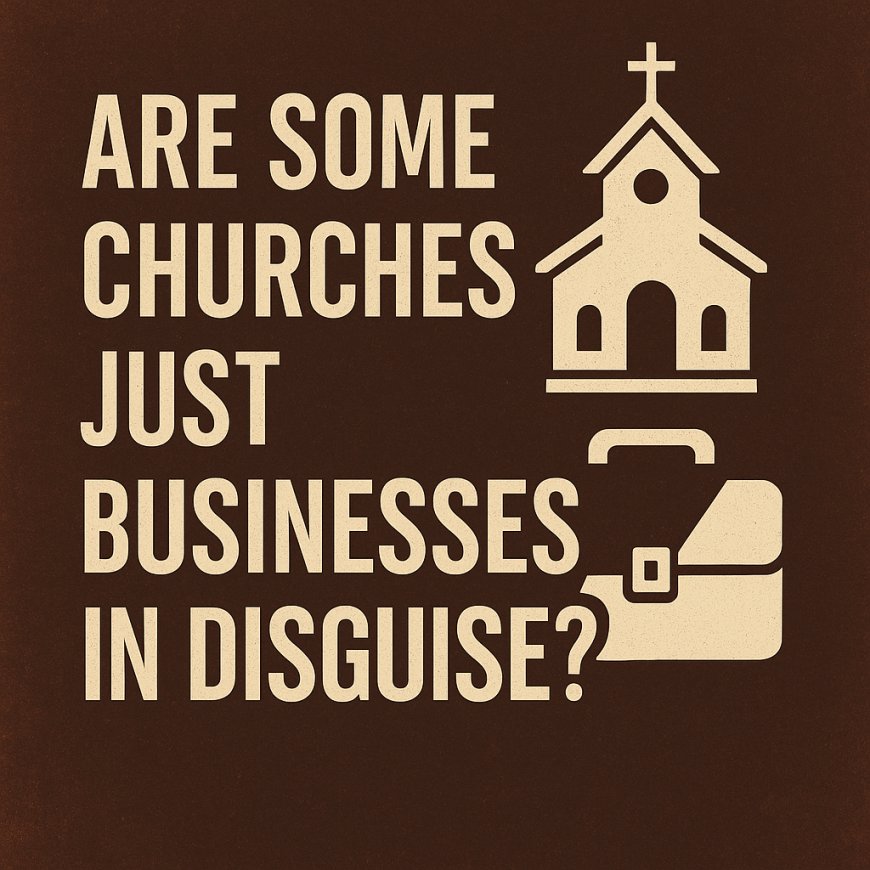Are Some Churches Just Businesses In Disguise?
This article explores whether some modern churches are just businesses in disguise, featuring real interviews and a thoughtful reflection on the blurred line.

As part of my internship at The WayOut media, I explored a timely and controversial question: Do you think some churches are just businesses in disguise? To understand how people really felt about this, I interviewed five people from different backgrounds and the findings were eye-opening.
In recent times, it has become common for pastors to have branding deals, churches to have branded merchandise for sale, and sermons to be accompanied with professional, Instagram-worthy graphics. The idea of churches being a lucrative form of modern business is a subject of intense discourse on social media. There are people who belong to the “don’t touch the anointed” school of thought, and there are others who use “all pastors are scammers” as their slogan.
The aim of this interview was to go beyond approval-seeking social media views and hear directly from individuals what they thought about the topic. The goal was not to stir controversy, but to gain insight into honest perspectives about the line (or absence of one) between churches and businesses in modern times.
The first person I spoke to did not hesitate before stating firmly that “yes, some churches are businesses in disguise.” He referenced scripture, pointing out that Jesus Himself warned about false prophets. To him, that warning is relevant today. He expressed concern that some of these “false prophets” are not driven by a calling but by the opportunities that come with controlling a congregation. For him, the line is clear, and it has been crossed in many cases.
The second respondent had a more nuanced opinion. She acknowledged that while some churches genuinely serve spiritual and community needs, others clearly prioritize profit. “When profit becomes the focus over purpose,” she said, “it’s hard not to question the intent.” She noted that there are churches doing real, impactful work that actually helps people. Her answer points to the difficulty of generalizing the idea that churches are businesses in disguise.
The third respondent, also a woman, admitted her answer made her uncomfortable. Still, based on personal experience she agreed that some churches seemed to operate more like competitive enterprises than spiritual homes. She described a situation where, as a first-time visitor to a church, she was pressured to switch from her regular church to that new congregation.
She also referenced how some churches closely monitor members’ tithes, even going as far as publicly announcing the amounts given. She concluded that “with all these, it is impossible to not see some churches as businesses in disguise.”
The fourth participant took a balanced stance. His view was that some churches are indeed businesses in disguise, but not all. “It depends on the leader,” he emphasized. For him, the authenticity of a church is closely tied to the personal conviction and calling of its head.
The fifth and final respondent gave what was perhaps the most passionate response. “It’s a yes and it’s a no,” she said, “because it depends on the church, the setting, and the pastor.” She acknowledged that there are churches where the pastors do not collect salaries, choosing instead to direct funds towards community service, like supporting orphanages. But she also criticized the growing number of churches where wealth and power are concentrated at the top while the members struggle. She mentioned how in “some churches, you will see their pastor riding benz and having private jet and the church members are suffering.”
She expressed frustration with how some churches guilt members into paying their tithes and offerings by claiming that if they do not, they are sinners and that “God will punish them.” At the end, she still reiterated that some churches are used to generate income, there are still those where the pastors were called by God.
After speaking with all five individuals, it was clear that the answer to the question is not a direct “yes” or “no”. There is simply a sense of concern about some churches whose spiritual work is being commercialized for the profit of those at the top.
Personally, I believe that in modern times, many churches operate with systems and structure. They use tools like branding, budgets, and operations. While these structures are similar to what can be found in some businesses, it does not automatically make churches businesses in disguise. The danger lies in allowing brand image and structure and financial success to overshadow the spiritual work and purpose of the church.
In the end, my answer to the question, are some churches businesses in disguise, is yes. Some are. But it is unfair and wrong to attribute that quality to all churches. There are many churches that remain grounded in their spiritual service. They support education, feed the hungry, offer safe spaces to people who need healing, and preach without profit. Churches like these might not trend online, but they make significant impact in their communities.
Both church leaders and members have a responsibility to keep the church aligned with its true mission. Leaders must examine their motives and submit to being held accountable. Members must be discerning and should demand transparency. When spiritual influence is left unchecked, it makes way for some greed-driven individuals to turn a church into a money-making enterprise.







